We started session 5 off with some serious vocal work. The lines I chose from our later readings proved to be extremely difficult to master, which made them perfect for our diction work and vocal explorations. We worked on the lines “You sockdologizing old man trap.” and “Emergency, oh emergency, please put the great man in the ground.” Just figuring out how to say them correctly took some time, then we tried some different ways of imagining our speaking, through a long slender tube, wrapping a sphere hanging a foot from our mouth, knocking an imaginary chair over. The first time we tried knocking our chairs over there wasn’t a lot of success. Most of those chairs hadn’t budged, and I told them so, so they asked me to demonstrate. I guess I must have done a pretty good job in my demonstration because when they tried again there was no chair left standing and some of them may even have been blasted across the room.
Then it was time for another mxtw standby: blossoming and withering. In this game you pretend you are a seed and through guided imagery you grow into a plant and then release your seeds or bloom and then wither back to the earth. It’s a little later in the process than we have done this in the past and I could tell, as many of the plants that grew in the first round were quite interesting. After round one Flinn gave them the choice of being either the most ugly insidious plant possible or the most beautiful benevolent plant and led the exercise again. From the moment they reached out their first shoots, that was a room full of hideous plants! I think three people chose beauty, and they were beautiful, it was obvious. Everyone else chose to be ugly and they were really committed to that ugliness. There were ugly faces and ugly limbs and ugly fingers and toes twitching hideously as they spread their ugly seed. Dig it.
Then we did some playing with non-imaginary chairs, just laying and sitting and standing, exploring how we can relate to this inanimate object. Then we put them in groups of three with the instructions that one person must always be laying, one sitting, one standing. The instructions are simple, but you must work with your group, if one person shifts, everyone must shift. I got to play this one, it was fun. After a bit of exploration Laura had us stop and watch the other groups so we could see how each group seemed to have its own style and feel. Just goes to show how you can never assume there is one right way to do these exercises, the possibilities change with every ensemble.
Our first reading was The Danube by Maria Irene Fornes. According to Fornes, she found some Hungarian language lesson records at a garage sale and was enchanted by the rote language and the tenderness found in the scenes despite the fact that the language was so limited. She says that when she was asked to create an anti-nuclear play her first thought was of the danger to those tender scenes. In The Danube much of the dialogue is directly taken from those language lessons, and the lines are heard in Hungarian on a recorded tape first and then spoken by the actors in English in many of the scenes. The characters meet and have simple conversations and speak of Budapest, two of the characters fall in love and get married. But as these simple scenes unfold the characters also begin to deteriorate, they become ill, their bodies stop functioning wholly, their clothes become covered with ash and strange drippings, and smoke rises from the floor between every scene. Close to the end of the play the characters even attempt to replay their actions using puppets, but the scenes turn out the same. There is nowhere to go. The play ends with a brilliant white flash of light.
Paul: Dearest Eve. How are you? Have you missed me? What is new? How is work? I am still under constant supervision. I must see the doctor at two each day. I am always hopeful. The doctors say that my teeth have caused it. It is not true. There is something in the air. It is natural I feel sad. Nothing I do makes me feel right. All my hours go into longing for you and the hour of my return. I have little hope. What do you think? All my love. Paul.
-Maria Irene Fornes, The Danube
Our second reading was The America Play by Suzan-Lori Parks. Parks visited K-State this spring to give a talk, which several people in the room were lucky enough to have seen (much to my despair, I was not one of them as I was far away in the Pacific Northwest at the time). Parks is concerned with creating missing history through performance. In The America Play we learn the story of the Foundling Father (the Lesser Known) who makes his living as a faker, impersonating President Lincoln. He had always been told he looked just like the Great Man and is frustrated that he and the Great Man can never catch up to each other in time.
The Foundling Father: . . . The Great Man lived in the past that is was an inhabitant of time immemorial and the Lesser Known out West alive a resident of the present. And the Great Mans deeds had transpired during the life of the Great Man somewhere in past-land that is somewhere “back there” and all this while the Lesser Known digging his holes bearing the burden of his resemblance all the while trying somehow to equal the Great Man in stature, word and deed going forward with his lesser life trying somehow to follow in the Great Mans footsteps footsteps that were of course behind him. The Lesser Known trying somehow to catch up to the Great Man all this while and maybe running too fast in the wrong direction. Which is to say that maybe the great man had to catch him. Hhhh. Ridiculous.
– Suzan-Lori Parks, The America Play
After visiting the Great Hole of History (that contains a daily show of the whole of history) on his honeymoon he leaves his family and his business of grave digging and moves out west to dig a replica of the hole. Soon he sets up a business where folks can pay to pretend they are John Wilkes Booth and shoot him as he sits laughing in a rocking chair. In the second act we see The Foundling Father’s wife, Lucy and son, Brazil as they attempt to dig up relics of the Foundling Father’s existence after he has died. Throughout the second act Lucy and Brazil hear echoes of gun shots and dig up wonders that they associate with their absent father and husband. Parks’s play reads like jazz with a free musicality of speech and rep and rev of conversations and ideas. Every moment of it holds seemingly infinite layers of potential meaning and implications.
We took so much time doing movement and vocal work in the first half of the session and the participants were so into the plays we read that the discussion took up all of the second half, so we only ended up taking one break. Three hours of moving and thinking intensely? This group eats that for breakfast.
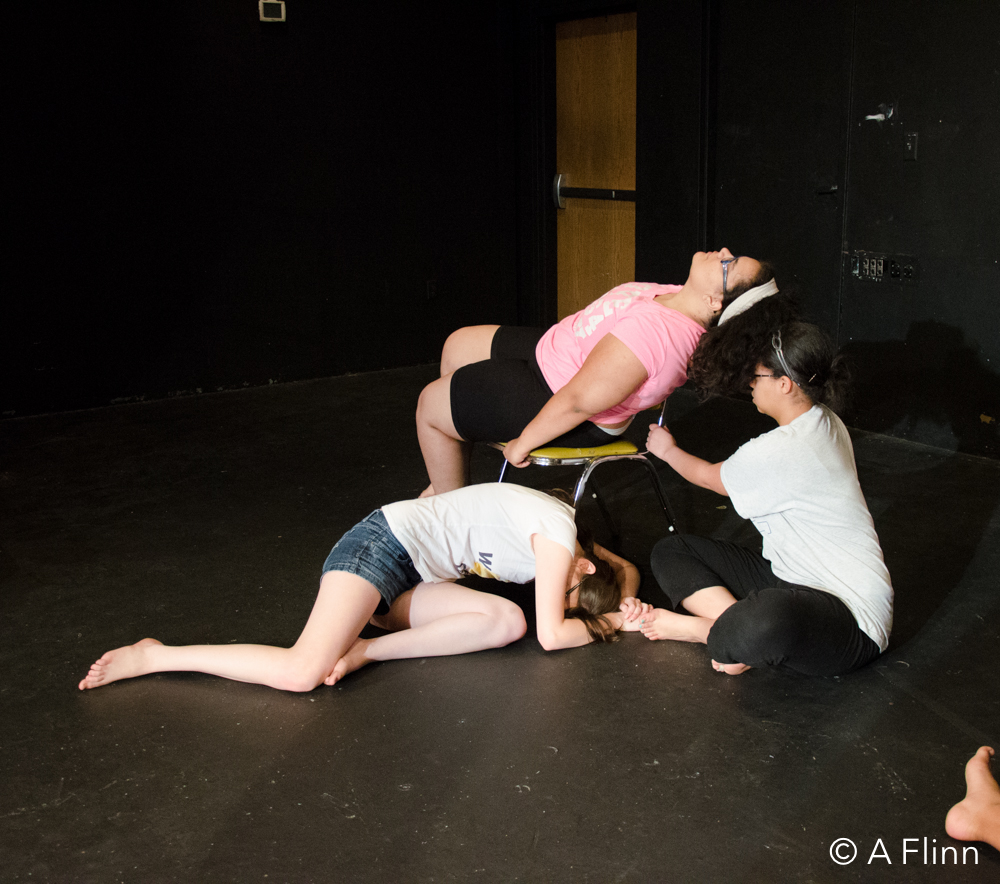
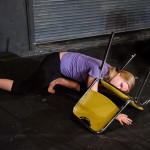
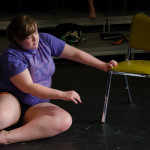
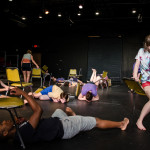
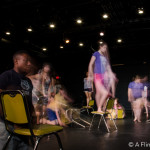
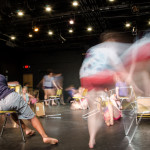
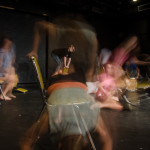
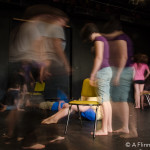
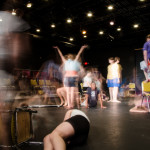
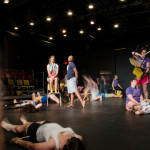
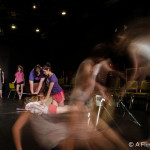
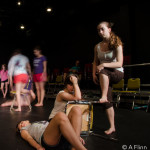
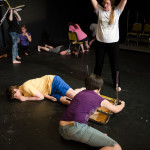
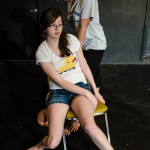
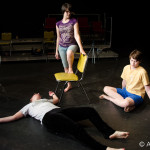
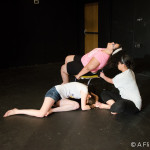
Leave a Reply
You must be logged in to post a comment.